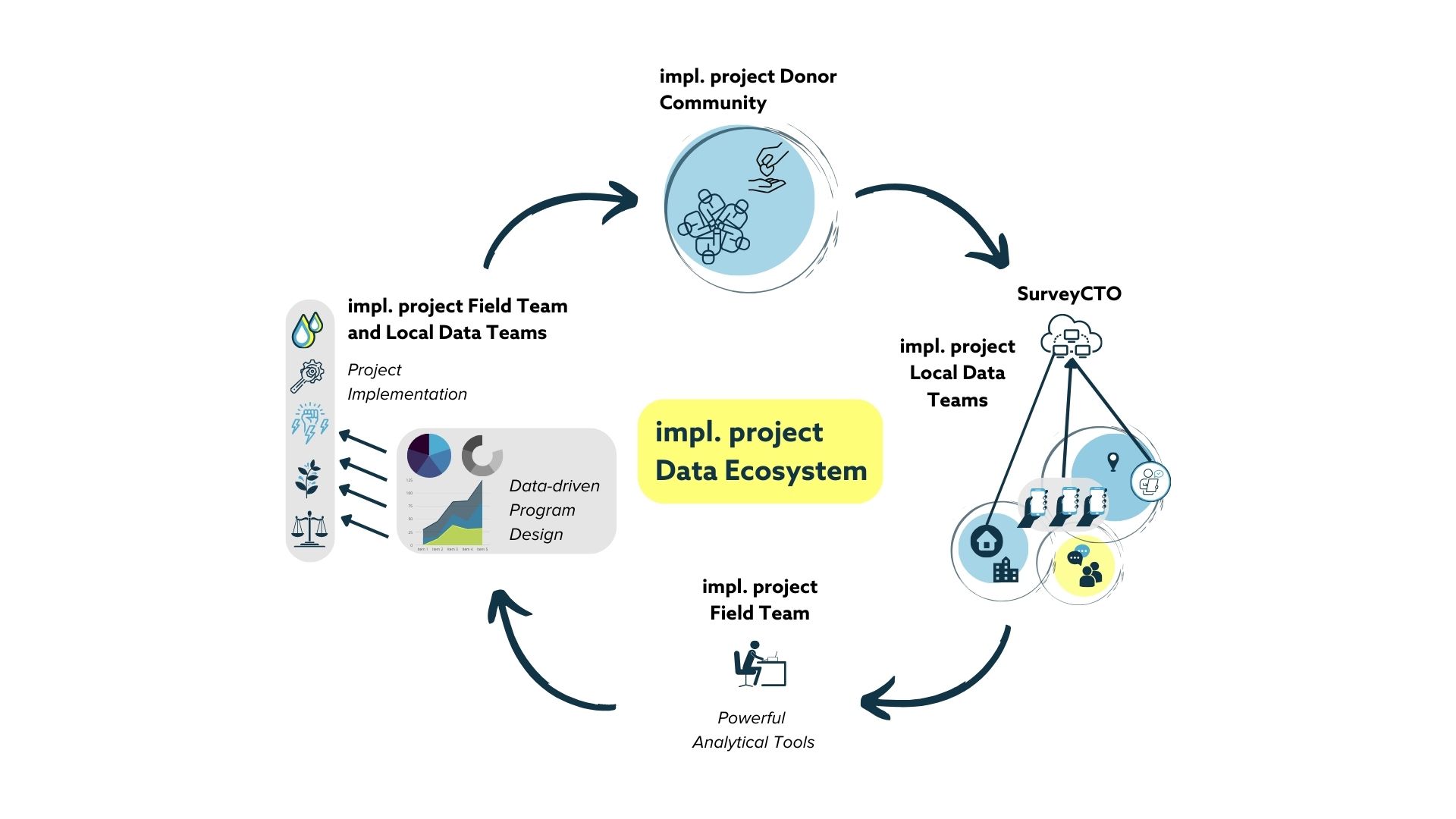IMPL. PROJECT’s unique Data Ecosystem is designed to address two barriers to programmatic success in unstable and fragile areas: one, the Data Ecosystem combines large scale quantitative perception survey collection with qualitative professional validation assessments to create a robust understanding of the focus community; two, the Data Ecosystem establishes proxy indicators in the target communities to create both a baseline for understanding what stability looks like in the local context, and tracks progress over time with indicators correlated with the issues driving instability.
Background

The international donor community faces increasingly demanding programmatic environments, coupled with higher levels of scrutiny from oversight authorities. The confluence of these obstacles is found in the lack of quality quantitative and qualitative local data for programming, and the inability to monitor unique communities in ways that both capture the right information but are also scalable.
IMPL. PROJECT is addressing these factors through its robust methodology and technology toolkit, creating one-of-a-kind Data Ecosystems around the world.
Methodology
IMPL. PROJECT’s methodology goes beyond logical frameworks to innovate on dynamic complexity mapping, reinforced by short data feedback loops. We begin with a robust quantitative perception survey datamapping effort for two reasons: one, we distrust prevailing narratives on unstable communities, often put forth by outsiders with dated qualitative information and poor quality quantitative data; two, we want to understand how a community frames its problems, its solutions, and who locals view as trusted actors. We build large, structured data sets by hiring locals who speak English and the target languages, training them in data literacy and our tech tools, and then tasking them on daily datamapping efforts. All of our data can be disaggregated by gender, age, ethnicity, village, and numerous other variables. IMPL. PROJECT’s turnaround time is fast. For example, on one datamapping project across 5 regions in Azerbaijan, IMPL. PROJECT collected more than 3,000 structured, geotagged surveys in just 10 days.
Once we have a broad cross-sectoral view of local grievances from high-quality quantitative data,, our team of experienced Monitoring, Evaluation, Learning and Design (MELD) professionals vet and validate the survey data by conducting qualitative assessments such as site surveys, key informant interviews (KIIs), and focus group discussions (FGDs). This enables IMPL. PROJECT to triangulate data sources to identify the drivers of vulnerability and their systemic causes.
Once instability dynamics are delineated, we work with our local staff to create indicator reports from various sectors where the drivers of instability manifest themselves. These indicators create baselines of the relative social health and resiliency of a community. IMPL. PROJECT’s field research has led us to identify two fundamental components of resilient communities: positive collective action, and broad, inclusive stakeholdership. Our indicators reflect these dynamics locally.

It is only after we have a broad, comprehensive view of a focus community that we begin our implementation process, which focuses on building positive collective action and inclusive stakeholdership by addressing the validated systemic causes of community instability. Alongside programming implementation, our local partners work closely with trusted local actors to build their data and tech capacities. All outputs, outcomes, and impacts are integrated via feedback loops into the Data Ecosystem, allowing IMPL. PROJECT and our donors and clients to continually update our understanding of fluid programming environments and make critical adjustments.
Technology Toolkit
What makes robust methodologies hard to implement is the difficulty of gathering and analyzing granular data in unstable and often dangerous environments. IMPL. PROJECT’s industry-leading technology toolkit overcomes these obstacles. While many organizations have succeeded in either implementing parts of good methodologies or deploying critical technology in the field, IMPL. PROJECT’s success is based on combining all critical components together in one holistic, deployable, and effective approach: our comprehensive Data Ecosystem.
A critical feature of IMPL. PROJECT’s approach is that we only deploy commercial off the shelf software. Open-source and free software frequently lack the engineering support, positive user interface, and scalability that commercial software provides. Since high quality, granular data is our starting point, we invest in commercial off the shelf survey software and smartphones/tablets to ensure the best tools to operate in austere and non-permissive environments. By using Survey CTO, coupled with Apple iPhones and iPads, we have a stable, scalable data gathering platform that allows us to collect surveys and conduct assessments without an internet connection, while still obtaining critical GPS coordinates for data points.
All surveys and assessments are cached on the smart device until the collections team reaches an internet connection and uploads the data to our cloud-based servers. Our donor organizations can view and monitor these collection efforts in near-real time via web-based dashboards. Critically, our tool kit allows for donors to trace the origin of data sources, ensuring the highest quality data through transparency and pedigree.
IMPL. PROJECT’s field teams export collected information into our analytical tools for data integration, visualization, and analysis. Our tools give our local partner NGOs the ability to map the complexity of the data, facilitating new understandings of community dynamics. We also heatmap the data geospatially by a variety of disaggregated factors to understand how issues affect communities and demographic groups differently. Coupling these tech capabilities with dynamic complexity mapping, IMPL. PROJECT creates a flexible, scalable platform for its data gathering and field programs.
